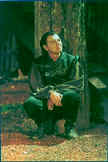To Be or
Not To Be
Judi Chow
 That is the question pondered by Hamlet under the creation of Shakespeare. This young prince of Denmark was agonizing over a choice of “to be” or “not to be.” What was he talking about? If you are familiar with the plot of Hamlet, then you know he was actually contemplating suicide when he posed that question. We also are faced with making decisions everyday, but usually not as severe as Hamlet’s case. How do we make decisions? What is our guiding principle? Consider the following incidents:
That is the question pondered by Hamlet under the creation of Shakespeare. This young prince of Denmark was agonizing over a choice of “to be” or “not to be.” What was he talking about? If you are familiar with the plot of Hamlet, then you know he was actually contemplating suicide when he posed that question. We also are faced with making decisions everyday, but usually not as severe as Hamlet’s case. How do we make decisions? What is our guiding principle? Consider the following incidents:
- I choose to pack leftovers for lunch, why?
- A newlywed chooses to trade their honeymoon for short-term missions, why?
- A coworker in Canada decided to move to Hong Kong for theological training, why?
- A couple decided to go to the mission field with their six-month old baby, why?
- An American family chooses to adopt two orphan girls from China while others choose abortion, why?
- Some people decide to get married while others choose to get divorced, why?
- Some Christians decide to pray while others choose to play, why?
Can you come up with some answers to these whys? Try if you like, but you might be making assumptions based on your own beliefs and limited factual information. Yes, it is going to be a biased judgment. It’s like taking pictures; as you look into the viewfinder, you can see only a portion of the view your naked eyes normally see. If you choose to zoom in, then you are selecting a specific area or subject that attracts you. Whatever calls your attention and causes you to focus in is based on your interest or what seems important to you. Do take note, what is important to you might not be important to others.
We make decisions based on our value system which is rooted in our beliefs we’ve adopted from our heritages as well as personal and spiritual experiences. The ultimate question I dare ask in our decision making is not necessarily the whys but who’s in charge here. Yes, God has given us free will, we are free to choose. We can choose to save money or save time. We can choose to be with others or be by ourselves. We can choose to please men or to please God.
To be or not to be, to go or not to go, to stay or not to stay, to give or not to give, to pray or not to pray, these are among the many choices we face everyday. How we can choose wisely depends on how much we are in submission to God’s will.

 That is the question pondered by Hamlet under the creation of Shakespeare. This young prince of Denmark was agonizing over a choice of “to be” or “not to be.” What was he talking about? If you are familiar with the plot of Hamlet, then you know he was actually contemplating suicide when he posed that question. We also are faced with making decisions everyday, but usually not as severe as Hamlet’s case. How do we make decisions? What is our guiding principle? Consider the following incidents:
That is the question pondered by Hamlet under the creation of Shakespeare. This young prince of Denmark was agonizing over a choice of “to be” or “not to be.” What was he talking about? If you are familiar with the plot of Hamlet, then you know he was actually contemplating suicide when he posed that question. We also are faced with making decisions everyday, but usually not as severe as Hamlet’s case. How do we make decisions? What is our guiding principle? Consider the following incidents: